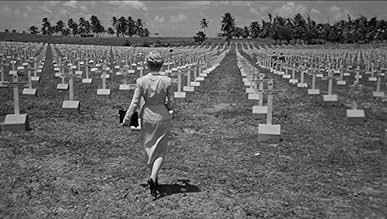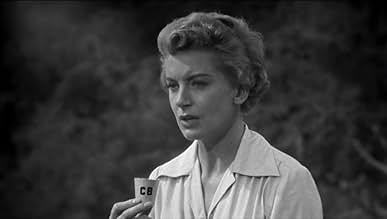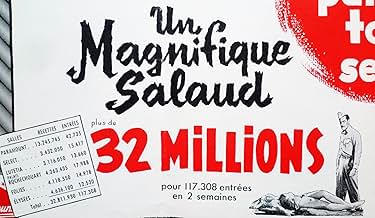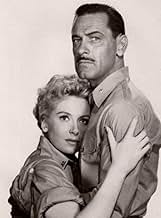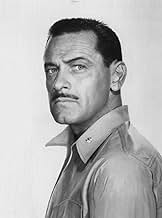IMDb-BEWERTUNG
6,2/10
788
IHRE BEWERTUNG
Füge eine Handlung in deiner Sprache hinzuIn the Pacific during WWII, a Roman Catholic widow falls for a tough lieutenant colonel.In the Pacific during WWII, a Roman Catholic widow falls for a tough lieutenant colonel.In the Pacific during WWII, a Roman Catholic widow falls for a tough lieutenant colonel.
- Regie
- Drehbuch
- Hauptbesetzung
- Für 2 Oscars nominiert
- 2 Nominierungen insgesamt
Claude Akins
- Big Soldier
- (Nicht genannt)
Nina Borget
- French Woman
- (Nicht genannt)
George Brenlin
- Casualty
- (Nicht genannt)
Lorayne Brox
- Sissie
- (Nicht genannt)
Evelyn Cotton
- Beth
- (Nicht genannt)
Maynard Ferguson
- Trumpet Player in Dance Scene
- (Nicht genannt)
Empfohlene Bewertungen
An intriguing recounting of the tolls of war from a human standpoint without graphic depiction of battle scenes, this focuses upon the lives of four primary characters stationed in Guadalcanal and/or Bataan, in the South Pacific, during World War II.
"The Proud and Profane" (Paramount, 1956) studies psychological aspects of its characters: Lieutenant Colonal Colin Black (William Holden in a belligerent role), Lee Ashley (Deborah Kerr as a determined force), Kate Connors (Thelma Ritter as a no-nonsense nursing supervisor), Eddie Wodcik (Dewey Martin as an innocent serviceman) and Chaplain Holmes (William Redfield as an altruistic minister).
While Lee volunteers with Kate's Red Cross troop with an ulterior motive in mind, Colin finds himself drawn to her unattainable reserve. Kate provides common sense for Lee to abide by and also security for the nurses and wounded service personal in her charge, as well as for Eddie, whom she treats as her nephew.
Produced by William Perlberg, directed by George Seaton, with its screenplay by George Seaton, based on a novel by Lucy Herndon Crockett, this wartime drama pleasantly buffers the viewer from unwelcome scenes of direct enemy attacks. Filmed in Black & White on location in Puerto Rico, this affords the viewer arrays of tropical scenery and often contains aerial footage of panoramic mountain scenery, as well as its calm coastal plains and lagoons.
Its capable cast handles its material well, with poignant portrayals of those who serve and suffer...in more ways than one.
"The Proud and Profane" (Paramount, 1956) studies psychological aspects of its characters: Lieutenant Colonal Colin Black (William Holden in a belligerent role), Lee Ashley (Deborah Kerr as a determined force), Kate Connors (Thelma Ritter as a no-nonsense nursing supervisor), Eddie Wodcik (Dewey Martin as an innocent serviceman) and Chaplain Holmes (William Redfield as an altruistic minister).
While Lee volunteers with Kate's Red Cross troop with an ulterior motive in mind, Colin finds himself drawn to her unattainable reserve. Kate provides common sense for Lee to abide by and also security for the nurses and wounded service personal in her charge, as well as for Eddie, whom she treats as her nephew.
Produced by William Perlberg, directed by George Seaton, with its screenplay by George Seaton, based on a novel by Lucy Herndon Crockett, this wartime drama pleasantly buffers the viewer from unwelcome scenes of direct enemy attacks. Filmed in Black & White on location in Puerto Rico, this affords the viewer arrays of tropical scenery and often contains aerial footage of panoramic mountain scenery, as well as its calm coastal plains and lagoons.
Its capable cast handles its material well, with poignant portrayals of those who serve and suffer...in more ways than one.
William Holden and Deborah Kerr demonstrate strong acting here about how war changes lives. And, how perhaps we make different decisions in war, then we would in normal life, such as risks to take (we take more in war), relationships (Holden: I don't know what's going to happen next so life is day to day.). Emotional hurt, widowhood, also play into vulnerability from these characters as well as the emotional hurt from lower society status.
The acting from Holden and Kerr was intense and realistic. I think perhaps some people might not like seeing them as imperfect people. Both make mistakes. They aren't always likelable, warm, and you'll only see Holden's radiant smile once. I admire them both for going against type, and they did it very successfully. Very flawed people, going through life -- like us all.
It was fascinating and i would see it again. It became more about the human condition than the romance, which I highly respected. There is no cute bowtie to tie it all up at the end, and it leaves you with life will continue, and how will each character continue on, communicate, make decisions when tough things happen in life.
I recommend this movie and I'll see it again. Different character acting by Kerr and Holden; their fine acting independently and together; make this extraordinarily watchful. Additionally, the key thing is not the romance, but the transformation of each character to a greater self honesty and honesty with the world.
The acting from Holden and Kerr was intense and realistic. I think perhaps some people might not like seeing them as imperfect people. Both make mistakes. They aren't always likelable, warm, and you'll only see Holden's radiant smile once. I admire them both for going against type, and they did it very successfully. Very flawed people, going through life -- like us all.
It was fascinating and i would see it again. It became more about the human condition than the romance, which I highly respected. There is no cute bowtie to tie it all up at the end, and it leaves you with life will continue, and how will each character continue on, communicate, make decisions when tough things happen in life.
I recommend this movie and I'll see it again. Different character acting by Kerr and Holden; their fine acting independently and together; make this extraordinarily watchful. Additionally, the key thing is not the romance, but the transformation of each character to a greater self honesty and honesty with the world.
This movie has been on YouTube for three years but not viewed very frequently considering the stars (William Holden, Deborah Kerr & Thelma Ritter) but perhaps that is because it is a far from perfect print.
The story focuses on how the experiences of war change three of the characters as it attempts to encompass the most important aspects of life: love & faith. War strips away everything that is not important and forces people to confront their true selves, sometimes with devastating results.
This is not a grand passionate romance, and those who criticize it because it lacks these qualities are missing the point of the movie. It is not so much about relationships with others, but about one's understanding of oneself.
None of the characters are particularly likeable but as the movie progresses we gradually come to understand their life experiences and why they are as they are. All are impacted by the destruction of war of which we only see the consequences. This is not a realistic depiction of war but rather how war changes people.
The story focuses on how the experiences of war change three of the characters as it attempts to encompass the most important aspects of life: love & faith. War strips away everything that is not important and forces people to confront their true selves, sometimes with devastating results.
This is not a grand passionate romance, and those who criticize it because it lacks these qualities are missing the point of the movie. It is not so much about relationships with others, but about one's understanding of oneself.
None of the characters are particularly likeable but as the movie progresses we gradually come to understand their life experiences and why they are as they are. All are impacted by the destruction of war of which we only see the consequences. This is not a realistic depiction of war but rather how war changes people.
It was strange, but interesting watching this movie. Deborah Kerr plays an American Red Cross volunteer who pulls strings to get assigned to the South Pacific to find out the circumstances of her husband's death on Guadalcanal. Thelma Ritter (excellent as always) plays her supervisor who becomes close to Kerr and is not liking what is going on. William Holden (who is unrecognizable, except for the voice) plays sadistic Colonel Black, who is attracted in to the upper middle class Deborah Kerr. It is an unusual role for Holden since his roles typically are suave, sophisticated and the handsome leading man type of parts. Compared to movies from current adolescent-minded writers, directors and producers, it is palatable.
The Proud and Profane (1956)
Yes, this movie features William Holden and Deborah Kerr, who do their characteristic best in a lower budget echo of the 1953 blockbuster "From Here to Eternity," also featuring Kerr (but with Lancaster and, for good measure, Montgomery Clift). The comparison is fair, because the similarities are too blatant, and so it's fair to also say that, as ordinary as this movie is, it had potential. There are qualities to the story line that are too moving (wounded soldiers in the Pacific, a widow tracing the last days of her Marine husband's life, a love affair against the rules) and the actors are too fine (add Thelma Ritter as an important third) to just dismiss the whole thing as a mess.
The director, George Seaton, is really a screenwriter, and though he directed a dozen features, none of them are especially memorable. His real fame rests on assisting with several great movies (like "The Wizard of Oz") and with a single brilliant coup--the screenplay for the original 1947 as well as the later TV version of "Miracle on 34th St." And it is no surprise that Seaton's own screen writing in "The Proud and Profane," though prosaic, is very good.
Ah, but filmmaking is about timing, flow, surprise, drama, light, shadow, and sounds of all kinds. This is the director's blank canvas and Seaton doesn't go anywhere in any of these areas. The light is bright and flat. The camera-work is functional and bland (cameraman John Warren being a newcomer, moving quickly to television, including many Hitchcock episodes). The score is strong (thanks to veteran master Victor Young) but there is no attempt to insert diegetic music or more interesting internal sounds. Even the supporting cast is pigeonholed into clichés (and there is no critical secondary male role, as Clift played in the 1953 movie). Thelma Ritter is at her best, more normalized than in other roles, but believable and superb.
I write all this for a routine movie because of Holden, who is an understated and sometimes brilliant actor, and Kerr, who I never warm up to but who is almost designed to be too cold to like. Kerr in particular is up and down here, at times so perfectly cast and so convincing you start to really watch closely, but other times she has to stretch her role a little (when she is dancing, for example, or in the cheesy beach scene early on) and it's awkward. Holden is made to be an enigma, and when he warms up (out of uniform) he's likable, and when he's cold, he's cold, but never admirable, which is what a commander needs to be at least.
I enjoyed this movie because I enjoy movies, but also because it has aspects that are terrific. If you really like war films that aren't about battle (as I do), this is a must see. And if you want perspective on "From Here to Eternity" you really will appreciate both films more. For just a fresh, well-made movie, terrific you will need to keep looking.
Yes, this movie features William Holden and Deborah Kerr, who do their characteristic best in a lower budget echo of the 1953 blockbuster "From Here to Eternity," also featuring Kerr (but with Lancaster and, for good measure, Montgomery Clift). The comparison is fair, because the similarities are too blatant, and so it's fair to also say that, as ordinary as this movie is, it had potential. There are qualities to the story line that are too moving (wounded soldiers in the Pacific, a widow tracing the last days of her Marine husband's life, a love affair against the rules) and the actors are too fine (add Thelma Ritter as an important third) to just dismiss the whole thing as a mess.
The director, George Seaton, is really a screenwriter, and though he directed a dozen features, none of them are especially memorable. His real fame rests on assisting with several great movies (like "The Wizard of Oz") and with a single brilliant coup--the screenplay for the original 1947 as well as the later TV version of "Miracle on 34th St." And it is no surprise that Seaton's own screen writing in "The Proud and Profane," though prosaic, is very good.
Ah, but filmmaking is about timing, flow, surprise, drama, light, shadow, and sounds of all kinds. This is the director's blank canvas and Seaton doesn't go anywhere in any of these areas. The light is bright and flat. The camera-work is functional and bland (cameraman John Warren being a newcomer, moving quickly to television, including many Hitchcock episodes). The score is strong (thanks to veteran master Victor Young) but there is no attempt to insert diegetic music or more interesting internal sounds. Even the supporting cast is pigeonholed into clichés (and there is no critical secondary male role, as Clift played in the 1953 movie). Thelma Ritter is at her best, more normalized than in other roles, but believable and superb.
I write all this for a routine movie because of Holden, who is an understated and sometimes brilliant actor, and Kerr, who I never warm up to but who is almost designed to be too cold to like. Kerr in particular is up and down here, at times so perfectly cast and so convincing you start to really watch closely, but other times she has to stretch her role a little (when she is dancing, for example, or in the cheesy beach scene early on) and it's awkward. Holden is made to be an enigma, and when he warms up (out of uniform) he's likable, and when he's cold, he's cold, but never admirable, which is what a commander needs to be at least.
I enjoyed this movie because I enjoy movies, but also because it has aspects that are terrific. If you really like war films that aren't about battle (as I do), this is a must see. And if you want perspective on "From Here to Eternity" you really will appreciate both films more. For just a fresh, well-made movie, terrific you will need to keep looking.
Wusstest du schon
- WissenswertesFeature-film debut of Frank Gorshin playing the uncredited role of "Harry." In the film's opening at dockside, just after Lee arrives, Kate stops to talk to Harry about obtaining a can of paint off his truck.
- PatzerThe US Army Air Force C-47 cargo planes are painted in post WWII paint scheme rather than the wartime green. When the Air Force became a separate service in 1947 the white over bare metal paint scheme as seen in the movie was adopted.
- Zitate
Chaplain Lt. (jg) Holmes: It must be wonderful to feel that one has lived such a perfect life... that forgiveness has never been necessary.
Top-Auswahl
Melde dich zum Bewerten an und greife auf die Watchlist für personalisierte Empfehlungen zu.
- How long is The Proud and Profane?Powered by Alexa
Details
Box Office
- Bruttoertrag in den USA und Kanada
- 3.900.000 $
- Laufzeit
- 1 Std. 51 Min.(111 min)
- Farbe
- Seitenverhältnis
- 1.85 : 1
Zu dieser Seite beitragen
Bearbeitung vorschlagen oder fehlenden Inhalt hinzufügen


